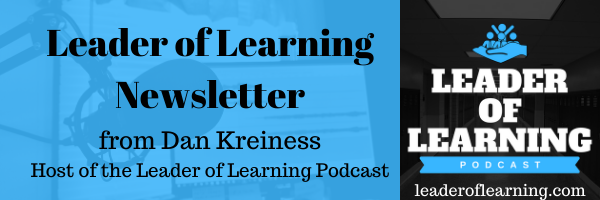Subscribe to the podcast!
[podcast_subscribe id=”2261″]
[Tweet “Check out episode 69 of the Leader Of Learning podcast about fighting teacher resistance by @dkreiness at leaderoflearning.com/episode69! #leaderoflearning”]
As a leader of learning, have you ever been in a situation when you have been skeptical about being asked to implement a new initiative? Have you been hesitant, resistant, or even reluctant to implement a new initiative? Have you ever tried to coach or help another educator who was resistant to implementing a change?
As I tell people all the time, if you have worked in education for more than a year or two, you have probably realized that the one thing that remains constant in education is that nothing ever remains constant in education. Change occurs so rapidly in the field of education that it can be a challenge to keep up with it all. The real question is how do you react to changes. Some educators are better at embracing change while others seem to be slower to react, seem to question change, or can even be reluctant or resistant to implement change.
When I became an instructional coach for the first time almost 10 years ago, I began to take an interest in how to work with teachers who are resistant or reluctant to try new things, to change their instruction or their methods in their classrooms. I even took a course on coaching that was provided by the Match Education organization in which the course presenters focused on coaching teachers through understanding certain types of fixed mindsets.
I won’t go too much into Growth Mindset Theory here but you might already be familiar with the research done by Carol Dweck or her book Mindset. Basically, her research explained how some people tend to perceive intelligence as more of a fixed or unchangeable characteristic while others consider intelligence as something which can be developed. The research led to the term growth mindset, which means that someone who possesses a growth mindset believes that a person CAN develop new knowledge, skills, and talents, whereas a fixed mindset is both the opposite of and the absence of a growth mindset. Individuals who possess a fixed mindset believe intelligence is fixed; a person either can do something or cannot. These mindsets may play a key role in determining whether or not a person might be resistant to change.
Resistance to change is real and research-based
As an educator and a doctoral candidate researching leadership practices to inspire a growth mindset in teachers, I have learned that resistance to change is real and research-based prevents people from changing, innovating, and performing. Resistance to change is very much like having a fixed mindset and can affect any educator, not just veteran educators.
In my dissertation and in my own original research, I was inspired by a few pieces of literature dealing with the concept of teacher resistance, or resistance to change. None were more informative or inspiring than the 2017 article that was published in the National Council of Professors of Educational Administration’s International Journal of Educational Leadership Preparation in 2017 called Resistance to Change among Veteran Teachers: Providing Voice for More Effective Engagement by Richard R. Snyder from Wartburg College. In the article, Snyder noted that one of the factors most affecting the effective implementation of reform is resistance to change. He also noted that veteran teachers in particular present unique challenges, and stereotypically show the greatest resistance for effective implementation of change.
Snyder’s research, which inspired the article, included a phenomenological, qualitative study, which he claimed would provide a voice for veteran teachers. Snyder conducted semi-structured interviews with nine veteran teachers who were all over 50 years old, taught for at least 20 years, and averaged 31 years of experience. The purpose of the study was to clarify reasons for resistance to change among later career teachers in order that educational leaders might respond in more meaningful and effective ways. Since veteran teachers may resist change for a variety of systemic or individual reasons, Snyder thought that understanding those reasons for resistance may provide educational leaders with more effective strategies for implementing change.
It is important at this point to emphasize that not all later career teachers resist change. As a matter of fact, a couple of other researchers whom Snyder cited in his article not only studies the differences between resistant and cooperative teachers but also distinguished types of responses to change by teachers, both positive and negative.
Why are teachers resistant to change?
Huberman (1988) initially proposed, then Hargreaves (2005) elaborated, various responses to change by later career teachers: continuing renewal, positive focusers, disenchanted, and negative focusers.
- Continuing renewal teachers identify ways to stay current and relevant, adopting new strategies throughout their career.
- Positive focusers will accept change, but predominantly within the confines of their own classroom. In their wisdom and later in life, positive focusers conserve their energy while focusing upon the students who cross their threshold every day.
- Disenchanted later career teachers are those who invested themselves in several school reform efforts, only to be let down. Skepticism exists toward new initiatives due to the tabling of previous efforts as well as the repetition of change initiatives
- Negative focusers are those veterans who work aggressively to undermine change, thwart any improvements that may threaten them, and use their political power to keep their life easy. They are the most outspoken, and the stereotypical resistant veteran teacher – “the bane of administrators’ lives”
These researchers also noted the importance of what they consider rewards when it comes to teacher beliefs and possibly resistance to change. Lortie (1975) identified various types of “rewards” associated with the selection of careers. Types of rewards are as follows:
- Extrinsic rewards focus on income, level of prestige, and potential power that comes with a position.
- Ancillary rewards include the work schedule and conditions associated with a particular job.
- Psychic rewards are the internal feelings of fulfillment for which one enters the profession.
- Goodson, Moore, and Hargreaves (2006) emphasized a final characteristic central to the later career teacher experience: teacher nostalgia. Nostalgia is “the major form of memory among a demographically dominant cohort of experienced older teachers”
- Two types of teacher nostalgia:
- Social Nostalgia
- “Social nostalgia” is the sense of family – a school’s community of staff and students – that teachers knew and experienced earlier in their career.
- Social nostalgia accompanies changes that take time away from, or change relationships with, colleagues and students.
- Political Nostalgia
- “Political nostalgia,” on the other hand, arises from a loss of autonomy stemming from mandated, top-down initiatives.
- These initiatives particularly result in the loss of independence, creativity, and status that veteran teachers once knew.
What have researchers found?
Although some of the veteran teachers who participated in Snyder’s study seemed to still support and embrace change, some acknowledged a more critical attitude toward new initiatives. I think we as educators can all relate to a time when we were first informed about a new initiative. What was our initial reaction? Was there an immediate hesitation? Similar to how many of us may have reacted, Snyder’s participants admitted that they would maintain strategies they deemed “best for kids.” I think we can all empathize with educators who will continue to do what they think is in the best interest of students no matter what.
Resistance to change theorists have emphasized the importance of clarifying the perception of resistance through conversations with those deemed to be resistant. Teachers consistently expressed their desire to have open conversations about reform initiatives. The teachers supported the belief that taking the time to think critically about new initiatives reflected the school’s long-term goals rather than resistance to those goals. Engaging these seemingly resistant individuals in clarifying conversations may strengthen the initiative while recognizing the legitimate mission and memory of the change recipients
Therefore, educational leaders benefit from being cognizant of changes that negatively affect relationships (social nostalgia) and changes that decrease teacher autonomy (political nostalgia). Implications for educational leader practice center on a greater awareness of psychic rewards, social and political nostalgia, later-career teacher experience, and engaging teachers in clarifying conversations. The research showed that later career teachers desire meaningful conversations with educational leaders about the implementation of new initiatives. I’m sure the same is true for newer teachers as well.
Several participants acknowledged they may be more critical of change but they were also willing to dialogue about the meaningful implementation of initiatives in their local context. A greater willingness on the part of educational leaders to provide a context for these conversations validates the experience of these teachers, clarifies their concerns about potential initiatives, and sets the stage for more effective engagement from all teachers.
Can we prevent teacher resistance?
While I don’t believe we can end resistance to change, there are definitely measures that can be implemented to reduce resistance. As previously mentioned, communication in the form of clarifying conversations is tremendously important when implementing any new initiatives. Furthermore, Snyder and other researchers have recommended that future research concentrate on the interaction between teachers and educational leaders during times of change, especially as the increasing presence of teacher leaders, instructional coaches, and other new roles for teachers and administrators only heightens the challenge of effective interaction for school improvement. Clarifying conversations that identify the meaning of any initiative at the local level may be time-consuming and messy, but they strengthen the ownership and implementation of change through shared leadership. These conversations validate the mission and memory of veteran teachers while legitimizing their psychic rewards.
Like What You See? Please Share!
[csbwfs_buttons buttons=’fb,tw,li,pi,yt,re,st,ml,sk’]
Want great content delivered right to your inbox?

[mc4wp_form id=”1618″]
